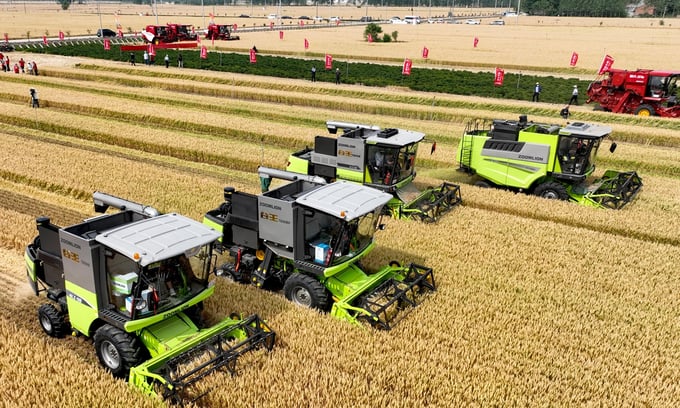November 25, 2025 | 14:22 GMT +7
November 25, 2025 | 14:22 GMT +7
Hotline: 0913.378.918
November 25, 2025 | 14:22 GMT +7
Hotline: 0913.378.918

An agricultural machinery operator drives a harvester at a farm in Bozhou, East China's Anhui Province on May 27, 2022. As Grain in Ear, a traditional Chinese calendar day signaling a proper time for farming, approaches, local farmers have ratcheted up efforts to either plant or harvest summer grain. Photo: VCG
Chinese farmers have started reaping their autumn crops and they're making steady progress now, with little impact seen from the severe drought in major growing areas this summer. Although the heat waves did weigh on crop yields, the overall impact of the drought is limited, farmers and experts said.
So far, 170 million mu (11.33 million hectares) of the autumn crops have been harvested, completing more than 13 percent of the set target, according to the Ministry of Agriculture and Rural Affairs (MOA).
More than half of the autumn crops have been harvested in Southwest China. In the middle and lower reaches of the Yangtze River and southern China, the harvested crops have accounted for approximately 20 percent. In Northeast China and regions along the Yellow River and Huaihe River, harvesting is sporadic so far, according to MOA.
Autumn crops have grown well in most areas despite the summer heat and severe drought, after wide-ranging measures were taken promptly to ensure irrigation, Li Guoxiang, a research fellow at the Chinese Academy of Social Sciences' Rural Development Institute, told the Global Times on Monday.
"The harvest is proceeding smoothly and steadily from the south to the north, and it's in line with the schedule," Li said. A broader harvest is expected to arrive in early October.
Farmers in major producing areas, such as Northeast China and the middle and lower reaches of the Yangtze River, told the Global Times that the drought has had a limited impact on yields, and local governments have been taking active measures to ensure the harvest.
A farmer in Jingzhou, Central China's Hubei Province told the Global Times that the drought had mainly affected early rice, but that the government's efforts to divert water from the Yangtze River had helped the planting of other rice varieties, which will be harvested in mid-October.
Hu Dan, a salesperson in agricultural machinery in the province, said that the local government pumped water into the planting bases day and night at the height of the summer drought season, which ensured the irrigation of 20,000 mu of grain there.
More than 40 percent of the grain and 70 percent of the corn have been harvested in Hubei, and it's been better than expected, with major grain-producing areas on track to produce 40 billion tons of autumn crops, mostly rice, Hubei Television reported on Sunday.
According to the meteorological observatory on Sunday, the drought is expected to affect Central China's Hunan Province, East China's Jiangxi Province, Southwest China's Chongqing and Southwest China's Guizhou Province in the coming days.
Looking forward, the lasting drought will not have a major impact on the yield as they have entered the harvest season, experts said.
"The bulk of the autumn grain harvesting will come late September and early October, and the autumn crop production has basically settled. For harvesting, dry weather is not bad," Jiao Shanwei, editor-in-chief of industry news website cngrain.com, told the Global Times on Monday.
(Global Times)

(VAN) Brazil's COP30 presidency pushed through a compromise climate deal on Saturday that would boost finance for poor nations coping with global warming but that omitted any mention of the fossil fuels driving it.

(VAN) Poultry farmers in the UK have been warned that they could face one of the worst winters yet for bird flu.

(VAN) Prices of main-crop paddy have risen sharply, with jasmine rice hitting 16,100 baht per tonne — the highest level in years.

(VAN) In Brazil, FAO unveiled a series of reports and initiatives showing how sustainable agrifood systems are a solution to the climate crisis.

(VAN) With names like neodymium and dysprosium, rare-earth elements sound exotic — and their perceived scarcity has only added to the mystique.

(VAN) In a new study published in Trends in Biotechnology, researchers used a gene-editing technology called CRISPR to increase a fungus's production efficiency and cut its production-related environmental impact by as much as 61%- all without adding any foreign DNA.

(VAN) A top official in Beijing’s Cop delegation says China is committed to clean energy – but US’s absence is a problem.